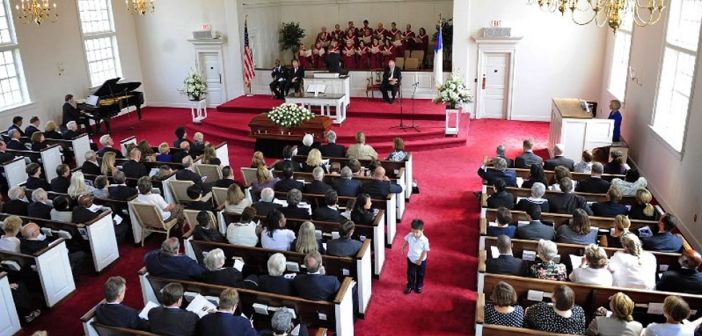Sarah Dorrance describes the pastoral challenge of helping surviving family members who do not attend church to understand that a Christian funeral is appropriate for a deceased relative who was an active church member. In this situation, a church funeral honors the faith life of the departed saint and is an outreach to friends and family who may not have been in church for a long time, if ever.
In a post-Christian culture, fewer and fewer people understand a Christian funeral as both a celebration of life and a celebration of resurrection in and through Jesus Christ. Consequently, considerations of local custom or convenience often become more important than faith considerations to the surviving family members planning a funeral. For example, it is often the case that adult children with limited church connections or religious sensitivities make funeral plans for a parent who radiated a devotion to Christ. We also sometimes have adult family members who want to skip the funeral all together.
Decisions about funeral plans for someone who has lived a long and rich life of faith deserve to be based on more than immediate convenience.
Decisions about funeral plans for someone who has lived a long and rich life of faith deserve to be based on more than immediate convenience. One question I ask the family members is, “Your loved one was a faithful member of this church. How would you like to honor your loved one’s life?” In addition, sometimes having the funeral at the church can even save the family some money.
A need for congregational education
This dilemma exposes a lack of leadership and education within the church. People would not think it strange at all for their religious leaders to share with them how even their funerals can bear witness to the faith they sought to live. This also opens the door to other topics such as cost, cremation, organ donation, memorial donations, and estate planning so that all the matters associated with death are consistent with a person’s faith and values.
Perhaps the most important guidance church leaders can provide for members is the opportunity to help pre-plan many of the components of their funeral worship. Providing guidance regarding options can help guide not only the pastor but also the family in the time after death.
Relationships with local funeral directors
A related issue is the church’s relationship with local funeral directors. If there is mutual respect and communication, it is more likely they will honor a pastor’s desire to be involved in the planning with the family from the beginning. The funeral director’s natural tendency may be to ensure that all events of the funeral, including the funeral itself, take place at the funeral home, or directly at the cemetery.
When the funeral is at the funeral home, there are still many opportunities for the continuing witness of the deceased. However, because the church is the site of key moments in life, a church funeral bears witness to the deceased’s faith through its symbols and design. The availability of hymnals or worship screens gives church leaders more influence over the content of the worship service.
Welcoming the stranger
Church funerals also give congregations an opportunity to “welcome the stranger,” in that many mourners may be in a church for the first time in a long time, if ever. This should be a reminder of how all our worship needs to reflect welcome, openness, and grace. If funeral worship is handled well, visitors may leave more open to faith than when they arrived.
Honoring our Saints
Recently we had a saint of the church pass away, and the family said that she had requested no funeral. This 90-year-old woman had mentored and encircled so many lives. We had an entire congregation grieving this great loss, and no way to gain closure since a funeral is also part of the grief process for those left behind.
I asked the family if we could have a time of sharing stories about their loved one’s life. They agreed. We invited people together to share stories of her life. The family even attended. Fifty other people attended, too! Those in attendance shared their stories. We were truly able to share this saint’s life. I offered prayers, read scripture, gave a commendation, and we sang “Amazing Grace” acapella at the end — everyone joined in the singing.
While it was not a funeral, it sure felt like a funeral to me. And, by the way, one of the people who attended told me, “I have not been to church in a long time. We just moved back into the area, I think I will come here next Sunday.” And that is what she did.
Related Resources
- Small Churches, Belonging, and the Harley-Davidson Funeral by Steve Willis
- Pay Attention to People Who Stay by Lovett H. Weems, Jr.







